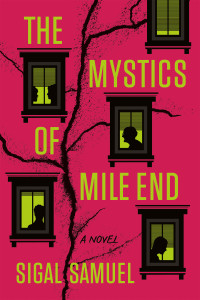Review by Carly Rosalie Vandergriendt
The Mystics of Mile End
Sigal Samuel
Freehand Books 2015
As someone who lives on the proverbial other side of the tracks from Montreal’s Mile End neighbourhood, I had high expectations for Sigal Samuel’s debut novel. More than familiar territory, the Mile End is practically mythic: not only has it been immortalized in much of Mordecai Richler’s work, since the 1980’s it’s been home to notable musicians, artists, and writers, including Arcade Fire and Giller Prize winning author, Sean Michaels.
Like Montreal’s very own Brooklyn, the Mile End is a recently gentrified (and no longer affordable) borough with an industrial past. Home to world-renowned bagel shops, eclectic cafés, and vintage clothing shops, it also happens to be home to a sizeable population of Hasidic Jews, who inspire more than a little curiosity from their Millennial neighbours.
Mystics doesn’t disappoint in terms of setting; the Mile End’s contradictions serve as a fitting backdrop for a dysfunctional family of three struggling with matters both material and metaphysical. David, a university professor, and his two children, Samara and Lev, each get separate, first-person sections in the novel, which progresses chronologically and spans over a decade. The first section, narrated by a young Lev, presents a thoughtful boy coping with the sudden death of his mother. In a peppy, almost breathless voice, precocious Lev is a lovable character as he considers matters of faith, questions which seem all the more poignant as both Lev’s father and sister withdraw into their own mysteriously private worlds. When Lev teams up with his logical-minded classmate Alex to call astronauts on the International Space Station using a ham radio, it’s an expertly crafted illustration of the link between science and spirituality. Before an audience of teachers and classmates, the boys must trust that they’ve done their calculations correctly. When the astronauts answer their call, Lev realizes that having faith doesn’t mean lacking knowledge, and that the higher power he wants to believe in might not be so radically different from astronauts.
The story jumps ahead in time, continuing from the father’s sceptic vantage point. David, who is gratifyingly flawed as a philandering professor and negligent dad, chose university over a Jewish yeshiva on the basis that “life was utterly meaningless and that was perfectly okay.” (108) He studies Jewish mysticism, or Kabbalah, through a secular lens until a heart attack sends him on a spiritual journey up the Tree of Life: “…the stages of the soul’s ascent towards God.” (110) Unfortunately for David, the realization that he may have missed the point of everything comes too late, as he muses: “But how I suddenly loved the question, black coffee and the smell of books, and a fine wine on a white tablecloth, and middle-of-the-night bicycle rides…” (149).
Samara’s plight in the third section of the book seems spurred on by the trauma of her father’s death. She drops out of university, sabotages her relationship with childhood friend and live-in partner Jenny, and becomes obsessed with her own ascent up the Tree of Life, guided by a manuscript on mysticism that her father was working on prior to his death. But in the middle of Samara’s section, it’s hard not to stop and ask oneself: where is all of this going? For me, it took too long to find out—by the time I reached the fourth section, which takes an omniscient point-of-view, the story had taken a few over-the-top turns, losing the focus and precision that made its earlier sections so engaging.
Nonetheless, Samuel does much right here. Her characters are skilfully wrought—it’s not easy to pull off multiple points of view in a single piece, but here, each is distinctive. A cast of quirky secondary characters makes for a well-furnished world, while Samuel deftly incorporates scientific and religious concepts as well as works of literature into the text. Her presentation of Judaism is well tempered, with her characters ranging from the secular to the orthodox to the mystical, with a few non-Jews thrown in for good measure. Samuel’s depiction offers an insider’s glimpse into a world that many of us come into contact with but can never really know—much like the faith that looms large in the lives of Samuel’s characters.
Carly Rosalie Vandergriendt is a Montreal-based writer of fiction, nonfiction, and poetry whose work has appeared or is forthcoming in The Malahat Review, Riddle Fence, and The Columbia College Literary Review. Visit her at www.carlyrosalie.com or follow her @carlyrosalie on Twitter.